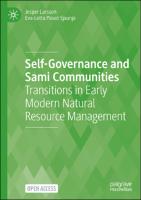Self-Governance and Sami Communities
Transitions in Early Modern Natural Resource Management
Author(s)
Larsson, Jesper
Päiviö Sjaunja, Eva-Lotta
Language
EnglishAbstract
This open access book uses an interdisciplinary approach that not only focuses on social organization but also analyzes how societies and ecological settings were interwoven. How did early modern indigenous Sami inhabitants in interior northwest Fennoscandia build institutions for governance of natural resources? The book answers this question by exploring how they made decisions regarding natural resource management, mainly with regard to wild game, fish, and grazing land and illuminate how Sami users, in a changing economy, altered the long-term rules for use of land and water in a self-governance context. The early modern period was a transforming phase of property rights due to fundamental changes in Sami economy: from an economy based on fishing and hunting to an economy where reindeer pastoralism became the main occupation for many Sami. The book gives a new portrayal of how proficiently and systematically indigenous inhabitants organized and governed natural assets and how capable they were in building highly functioning institutions for governance.
Keywords
Economic anthropology of Sami communities; Natural resource management; Natural resource management history; Socioecological systems; Sami self-governance; Reindeer husbandry; Land-use practices; Property rights and economics; Open AccessDOI
10.1007/978-3-030-87498-8ISBN
9783030874988, 9783030874988Publisher
Springer NaturePublisher website
https://www.springernature.com/gp/products/booksPublication date and place
Bern, 2022Imprint
Palgrave MacmillanClassification
Environmental economics
Anthropology
Historical geography
Economic history
Agricultural science
Political economy


 Download
Download Web Shop
Web Shop